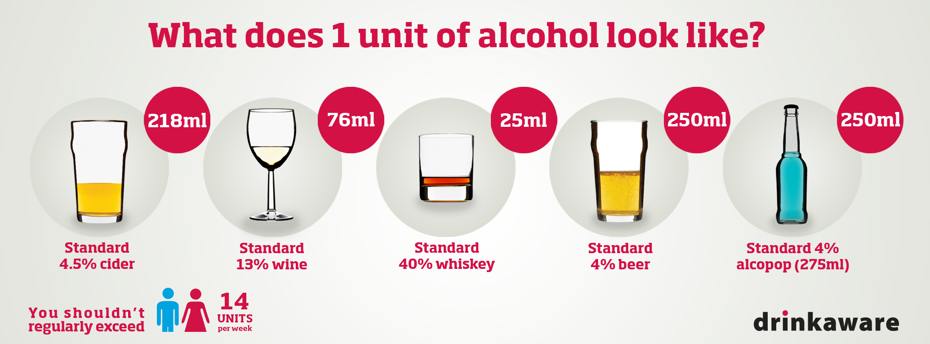Why should we worry about the amount of alcohol we drink?
In 2014, there were 6,831 deaths which were related to drinking alcohol, a number that is increasing. 10.8 million people in England are drinking at levels that could harm their health.
Harmful drinking of alcohol can cause cancer including liver, stomach, mouth, bowel and breast cancers. It can also cause liver disease, heart disease, strokes and it is linked with mental health problems from depression to suicide.
How much alcohol should we drink?
- To keep health risks from drinking alcohol to a low level, you are safest whether you are a man or a woman, not regularly drinking more than 14 units per week.
- If you do drink as much as 14 units per week, it is best to spread this evenly over three days or more, not drinking them all on one occasion.
- If you are pregnant you should not drink any alcohol.
- Many people don’t realise that alcohol is high in calories. If you want to lose weight and have a balanced diet you should look carefully at the calories in alcohol.
- If you want to cut down, try to have several drink-free days each week.
What does one unit of alcohol look like?
- 218 ml (less than half a pint) of standard 4.5% cider
- 76ml of standard 13% wine
- A single 25ml measure of 40% whisky
- 250ml (around half a pint) of standard 4% beer
- 250ml (less than a bottle) of standard 4% alcopop

What is higher risk drinking?
Here are some examples:
A woman who drinks around three bottles of 11% alcohol wine a week - around two large 175ml glasses of wine per day - increases the risks to her health. A woman who drinks four or five bottles of 11% alcohol wine - around three large 175ml glasses of wine per day or more - has a high risk of harming her health.
A man who drinks between five and 17 pints of strong beer, lager or cider at 5% alcohol per week - around 1 to 2.5 pints per day - increases the risks to his health. A man who drinks over 17 pints per week of strong beer, lager or cider at 5% alcohol per week - over two - three pints per day or more - has high risk of harming his health.
What is lower risk drinking?
All drinking carries some kind of risk because humans were not designed to drink alcohol! Lower risk drinking, is drinking 14 units or less per week for both males and females. However, you can reduce these risks by:
- limiting the total amount of alcohol you drink on any occasion
- drinking more slowly, drinking with food, and alternating alcoholic drinks with water
- avoiding risky places and activities, making sure you have people you know around you and ensuring you can get home safely
The morning after
Lots of people don’t realise just how long it takes alcohol to leave your body after drinking. If you drink one bottle of wine it can take up to 13 hours before you would be safe to drive. It is recommended that you have no alcohol in your body when you drive. Alcohol breaks down at roughly one unit per hour. You should start counting when you finish drinking and add one hour.

Healthy You Alcohol Health Trainers
Healthy You Alcohol Health Trainers can support you to reduce your alcohol intake. The free Drink Less service provides advice, support, and encouragement on how you can reduce your alcohol consumption. There is a programme of 6-8 sessions for up to a year.
You will receive support from your own 1:1 alcohol reduction specialist, who will empower you to design your own personalised plan. This will include assessing your relationship with alcohol, advise on units and reducing risk of alcohol related health issues. Discuss other areas of health you may wish to address and set achievable, sustainable goals. You can also be signposted to specialist services if required. Appointments are available at GP practices and community locations across Cambridgeshire and Peterborough. Telephone support is also available.
Who health trainers can help
Anyone aged 18+ drinking more than the recommended weekly limit of 14 units. Lives in, or is registered with a GP in Cambridgeshire or Peterborough.
Local sources of information and support
Change Grow Live (CGL): Cambridgeshire‘s Drug and Alcohol Treatment Service, for information about where you can get advice and support.
Casus: Cambridgeshire's child and adolescent substance use service, for information, support and specialist treatment.
The Cambridge Recovery Service (CRS) is a service user and volunteer-led community-based service that aims to help you build a sustained, holistic and purposeful lifelong recovery from addiction.
Other concerns
Harmful levels of drinking is sometimes linked to other issues such as domestic abuse. Find out more.
Further information and support
You can find out more and download a morning after drinking app.
NHS Choices tips on cutting down on alcohol.
Public Health England One You effects of alcohol.
Drink aware information to help people make better choices about drinking.